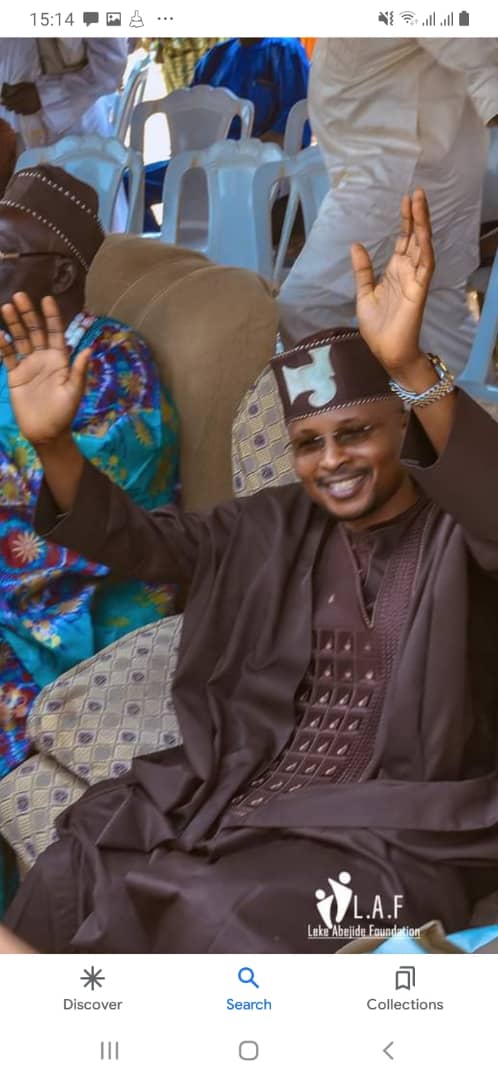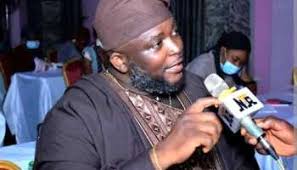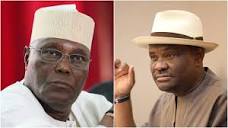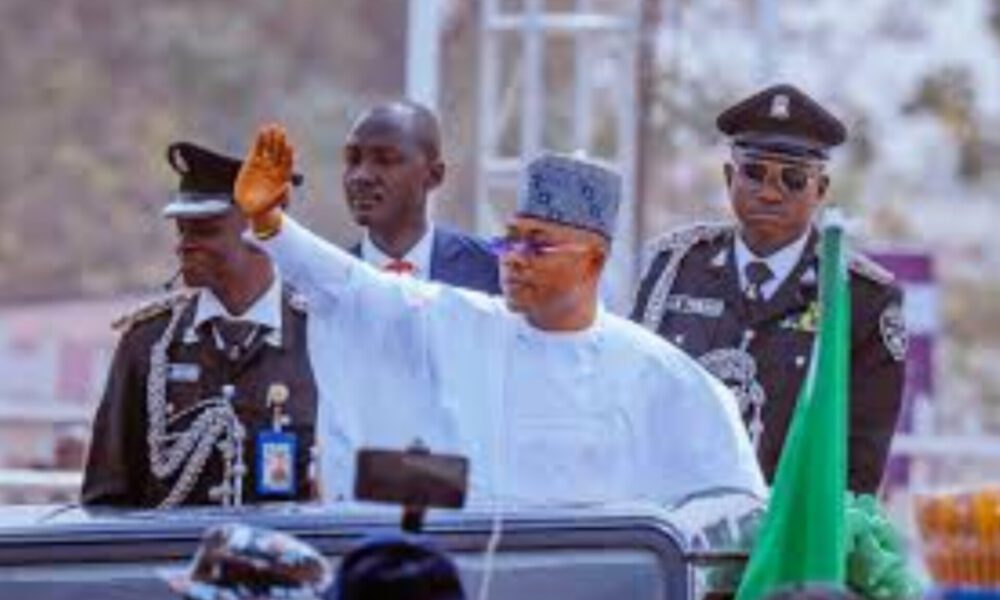By Tunde Olusunle
Come Monday October 10, 2022, Leke Joseph Abejide, Member Representing Yagba Federal Constituency in the House of Representatives, will be conferred with the title of Maiyegun of Egbe. Egbe, a major town in Yagba West local government area, (LGA), Kogi State is host to a number of historic institutions. The famous Sudan Interior Mission (SIM) Hospital, was established in the community in 1952, by the iconic Canadian missionary and surgeon, Frederick George Campion. The medical facility has since metamorphosed into the Evangelical Churches Winner All, (ECWA) Hospital and remains a major health institution, serving patients from the contiguous Kwara, Kogi, Ekiti, Ondo and Niger states. Late founder of the Synagogue Ministries, Prophet Temitope. Bamidele Joshua did testify, that his mother was delivered of him at the ECWA Hospital, Egbe, after he had spent 15 months in her womb. Before that auspicious time of his mother birthing him, she had been taken around several clinics and hospitals, without a solution.
Egbe is also the host community of the renowned Titcombe College, established in 1951. The institution has been at the core of knowledge impartation for thousands of youths from across the country, into the seventh decade and still counting. Notable graduates of the school include Adeyinka Adeniyi, who hails from Egbe, and who retired as a Major General from the Nigerian Army. So was the late Ibrahim Kefas, an Air Commodore who served as military administrator of Cross River State and Delta states, respectively. There are also Bayo Ojo, SAN, former Attorney-General and Minister for Justice, and Samuel Afolayan, a retired Vice Admiral and former Chief of Naval Staff, (CNS), who both served in the Olusegun Obasanjo administration.

Olu Obafemi, Emeritus Professor of English and Dramatic Arts, and 2018 recipient of the Nigerian National Order of Merit, (NNOM), is also an alumnus of Titcombe College, Egbe. So was Pius Adesanmi, the Canadian-Nigerian distinguished professor of literature and public intellectual, who died in the Ethiopian Airlines crash of 2019. Former Director-General of the National Institute for Security Studies, (NISS), Toyin Akanle, (PhD), and the incumbent Agbana of Isanlu, Oba Moses Babatunde Etombi, are both products of the college. This is not forgetting Solomon Adebola, Professor of Management Sciences, University of Ibadan, (UI).
Abejide’s installation with the “Maiyegun of Egbe” title, will be conducted by the *Elegbe of Egbe, Oba Ayodele Irukera, a revered royal and retired university bureaucrat. It will be the most recent of a string of honours and recognitions he has received in recent years and months. His previous investiture as Asiwaju of Alu his birthplace in Yagba East LGA, was attended by Abubakar Badaru, governor of Jigawa State. His more recent recognition with the title of Asiwaju of Yorubas in Kano, was graced by the Kano State chief executive, Abdullahi Umar Ganduje. All of these speak to the deep affiliations and broad network of a man, whose career is rooted in the catacombs of time and space.
Abejide came unto the political scene in Yagba federal constituency, the single largest sub-Okun sociocultural bloc, a green horn, a total neophyte. He ventured into a terrain which had hitherto been dominated by the Peoples’ Democratic Party, (PDP), with a fleeting glimpse of the All Progressives Congress, (APC). For the avoidance of doubt, beginning from the return of democratic governance in 1999, the PDP has produced three out of the four preceding members of the House of Representatives, the position he desired. Sola Ojo, an attorney from Mopamuro local government area, (LGA); Tolorunju Faniyi, an investment and management consultant, (Yagba East) and Samuel Bamidele Aro, a businessman, (Yagba West), all contested and won under the umbrella of the PDP.
They all served for one term of four years each in the “green chamber,” the way the House of Representatives is commonly described. This was in consonance with the mutual agreement between all three local government areas in the constituency, to this effect. Backed by the billionaire Jide Omokore who hails from Isanlu, Sunday Karimi, a businessman from Yagba West who vied for the position in 2011, did so on the platform of the APC. He ran against the established rotational template, which ordinarily, should have seen a candidate from Mopamuro, fielded for the office. Karimi would subsequently leverage his incumbency to take a second shot at the position in 2015, in total dismemberment of the preexisting “single term per LGA” arrangement.
Our subject in this instance, however, seemed to have been properly guided by the crippling socioeconomic situation in Yagbaland, in the run up to the 2019 general elections, before pitching his political tent. He desired to serve his people as their voice, their eyes and eyes in the green chamber. But he was ranged against two dominant political parties which could be a hard nut to crack. He zeroed in on the knowledge industry in Yagbaland, which like its brother subsets in Okunland, is the biggest preoccupation in the federal constituency, when juxtaposed with subsistence farming.
At the last tally, full professors from Isanlu, headquarters of Yagba East, for instance, were 40 in number. In recent years, unfortunately, globally respected professors like Pius Adebola Adesanmi from the same community, very painfully, passed on, depleting the numbers. Pioneer Vice Chancellor of Bingham University, Abuja, Felix Anjorin, another distinguished professor from Isanlu, also departed a few years ago. About a dozen other academics from the same community, are very senior associate professors, awaiting substantive elevation to full chairs. Statistically, the Yagba sub-country has a total of 70 secondary schools, spread across the three LGAs which constitute the federal constituency. There are 47 government-owned, and 27 privately established. This is testament to the subsisting hunger and thirst for literacy and education in the constituency. This is the catchment area Abejide desired to serve.
The salaries of civil servants and teachers in government employment who constitute the bulk of the rural intelligentsia, were paid in distinguishedly erratic, phenomenally miserly, even preposterously inconceivable percentages by the state government. There was palpable apprehension that thousands of students in year three of the Senior Secondary School, (SSS 3), may not be able to write the Senior Secondary School Certificate Examinations, (SSSCE). Looped to this was the fact that these same students would not sit the Unified Tertiary Matriculation Examination, (UTME) in their quest for placement in universities, polytechnics and colleges of education. The SSSCE is a major prerequisite for consideration for admission into higher institutions.
Enter, Abejide, a little-known young economist and businessman. He had hitherto lived and worked in Kano, the famous epicentre of commerce in Nigeria’s idyllic North. He had made a name out there in shipping, logistics, oil and gas, including venturing into cross-border business. Abejide in 2018, offered to foot the SSSCE bills of all the students, in all government-owned secondary schools in Yagba catchment. It was an unheralded precedent. A few people from his political sub-zone who were visibly better endowed in their time, never conceived of, nay implemented any such human resource development schemes. By this singular stroke, Abejide won over not just the admiration of the benefitting youngsters, he equally touched the hearts of their parents. They had been saved the shame of obvious incapacity to see their children and wards through a most critical phase of their academic development.
By the time Abejide announced his decision to contest for the Yagba House of Representatives seat with the approach of the 2019 general elections, he had become something of a household name. The fact that he opted to fly the flag of the rather strange and unknown African Democratic Congress, (ADC), was no obstacle. The electorate who had previously been schooled and stuck with the “umbrella” and “broom” logos of the two bigger parties, seamslessly acceded to very swift and noteworthy political reorientation and adaptation. It was going to be the party with the “handshake” this time around, and not any other. Abejide triumphed over his opponents from the PDP, James Fabola, a seasoned attorney from Yagba East, and Henry Abimbola of the APC, from Mopamuro.
In the green chamber which has 360 members, Abejide is something of an “orphan.” He is the singular, sole and only member of his party the ADC in the entire parliament. But recognition came quickly for him. Following the inauguration of the House in June 2019, he was appointed Vice Chairman of the Committee on Customs and Excise. Following the unfortunate demise of the substantive chairman, he was in March 2021, upgraded and confirmed the chairman. Such acclamation as a green horn in the parliament, and a non-member of the ruling party, is a rarity.
Abejide, however, has served Yagbaland, and indeed Okunland with distinctive verve and diligence, since his first day in the parliament. From the rehabilitation of roads, bridges and culverts, through the provision of potable water for his people; from equipping hospitals, through the construction of classroom blocks; from rural electrification projects, to electricity infrastructure; from the construction of facilities for security operatives, through support for enhancing agricultural productivity, Abejide has been untiring, his imprimatur in virtually every pie. The traditional homeward drift of individuals and families during the last yuletide for instance, was facilitated substantially by Abejide’s interventions. The Iyamoye to Igbagun, the Igbagun to Ife-Olukotun, Omuo to Igbagun and the Alu to Igboero, the Iluhagba-Mopa-Isanlu roads were either rehabilitated or built anew by Abejide.
Elsewhere, Abejide has directly facilitated the absorption of almost three dozen Yagba youngsters, into various federal ministries, departments and agencies, (MDAs), thereby providing lifelong livelihoods for them. He has continued to empower his constituents in various ways, including the provision of 100 motor vehicles; a combined 100 tricycles and motorcycles; 200 water pumps and 500 generators. Determined to accentuate the permeation of information technology to his people, he is building a 300-capacity ICT Centre, and has made available 100 brand new laptops for starters. This is besides placing about 50 students of tertiary institutions on his direct scholarship.
In conjunction with the National Directorate of Employment, (NDE), Abejide has anchored vocational training programmes for youths in his catchment.
Recognising the criticality of agriculture in the socioeconomic sustenance of his people, he is powering the construction of an agricultural research centre in Yagbaland. Each farming cycle, he distributes fertilisers and seedlings to farmers, and has also opened access for his people to agricultural loans provided by the Central Bank of Nigeria, (CBN). He has been credited with the distribution of over 20,000 palm and cashew seedlings across his homeland, in an effort to revive agricultural production. So variegated and impactful are Abejide’s undertakings that it will take a while by aspirants to his seat, to approximate or better his milestones. It has indeed been suggested that except if Abejide is deploying his personal resources to augment the multifaceted uplifting of his constituents, he might have unwittingly exposed representatives who never went half the mile he has gone.
A few months back, Abejide as Chairman of a fundraiser for the development of an Okun Unity House, domiciled in Kabba the traditional headquarters of Okunland, made an initial donation of N20 million, to the project. He had noted inter alia at the event, that Okunland is too big and too sophisticated not to have a central sociocultural address. He has equally promised to be more pan-Okun in the immediate future, in underwriting the examination expenses of students in all secondary schools, public and private across Okunland and indeed Kogi West.
Leke Joseph Abejide was born May 8, 1975, in Alu, Yagba East local government area, Kogi State. He schooled at the Alu Community Secondary School, graduating in 1991. He obtained a bachelors degree in Economics from the Ahmadu Bello University, (ABU), Zaria, and a masters in Business Administration at the Bayero University, (BUK), Kano. His area of research interest was “entrepreneurship development.” He developed a passion for business and commerce while still an undergraduate which helped to define his future career path. He established and nurtured a non-governmental organisation, the “Leke Abejide Foundation,” which enables his structured interventions in the mediation of the challenges of the less privileged. He has been active in his own way, on the floor of parliament, moving motions and contributing to issues of communal and national interest. He has been honoured with several traditional appellations for his service to his people. Notably, he is also the Asiwaju of Yagbaland, a title invented and bestowed on him, by the agglomeration of royals from Yagbaland, at a ceremony in Mopamuro LGA. L to has been ordained as an “Elder” in Christ Wisdom Church, Kano and is happily married with beautiful children.
Tunde Olusunle, PhD, poet, journalist, author and scholar is a Member of the Nigerian Guild of Editors, (NGE).




